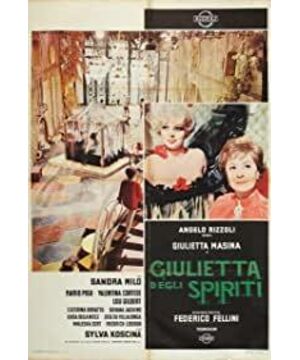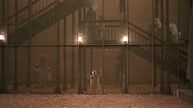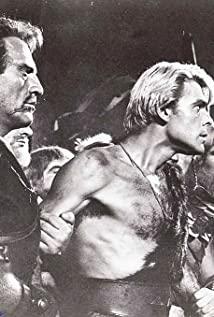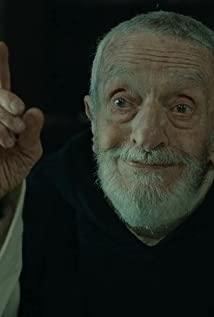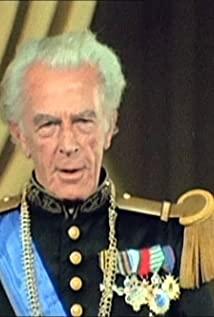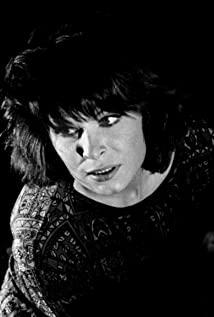If it weren't for Fellini's diehard loyalists, he wouldn't have the patience to watch "Juliet and the Devil" in two hours and sixteen minutes.
In fact, I didn't tell any stories for more than two hours. I wanted to tell stories. That is to say, a rich lady found out that her husband was having an affair, and in the process, she began to be suspicious and see ghosts. The real and the unreal began to mix in her world, and the illusion would suddenly appear in front of people without warning, Juliet fell into endless panic, and the audience could only accompany her step by step to the abyss. But if it is Fellini's diehard, you will find that this is not a movie that should be understood in terms of "story" at all. After the seamless blend of reality and fantasy created by "Eight and a Half", Fellini uses this film to push that blend to the extreme. Between reality and fantasy, Juliet and the Devil echoes the tradition of subjective realism at a distance, and is essentially an exploration of the spiritual world of man. This work may be the first psychological thriller film for later generations, although it does not focus on rendering the atmosphere of horror like many later films. Chinese people talk about yang. When a person's yang is weak, ghosts can easily invade his consciousness. The same is true for this movie. There is a gap between Juliet's existence and self, who is trapped in marriage, and an illusory image takes advantage of it. Her life's memories of death and destruction (such as her harsh mother, and the horrific experience of being crucified while tied to an iron bed) beckoned to her, and Juliet fell into her inner demons, almost to destruction. When you sink into Juliet's real and phantom power long enough to hold out until two hours and six minutes, you'll start to pay off. This is the climax of the film's colorful style, and it is also the only ten minutes of the finale in the history of film. After finally getting the satisfaction of watching the movie from these ten minutes, I am willing to record these ten minutes one by one:
Juliet's husband left indifferently, his affair was certain, and their marriage was almost doomed. Juliet was powerless to fight, she sat in the empty room, crying alone. She looked up and saw a doomsday scene in front of her.
A masked devil appeared in the house:
Weird clowns and handsome men appear one after another:
In fear, Juliet gritted her teeth and said to them: You are not real! go away!
The ghost disappeared, but it came again in an instant, this time it was the Nazis in the rain, and her girlfriends who were babbling about:
Various ghosts occupy the room:
Julia fled back to the bedroom, with her mother in front of her:
She begged her mother to save her, but her mother wanted to take her away:
At this time, the ghosts in the house approached:
Then Juliet finally woke up, she got rid of her mother, opened the door and walked into a bright world. She saw her childhood self nailed to the iron bed, she struggled to untie the ropes that bound her, and hugged her childhood self in her arms.
When she was a child, she met her grandfather, the one who loved her the most. Grandpa took her to say goodbye to those ghosts.
At this time, the terrifying Specter suddenly turned into a group of circus actors (circus again! Fellini's eternal metaphor!). They waved away in a huge carriage.
And grandpa is going to take a plane with his lover:
He said to Juliet, "This plane is too old to take you anywhere. We're leaving, you can't, because you're a living human being." At this point all visions disappeared, and Juliet looked at the grass and In the distance, she has defeated her inner demon and was completely relieved.
This is a poetic ten minutes. A woman's inner world is almost on the verge of destruction, but she finally saves herself. In such an inner battle, only Fellini can be so unrestrained and restrained. So what liberated Juliet from the predicament of memory and reality? What drove her demons away? It was the love that her grandfather represented. Love is the savior of the human soul. I was a little moved to see this. Fellini went from "Eight and a Half" to "Juliet is also the Devil", although the form is more radical, the theme begins to return to simplicity and warmth (rather than the cool indifference or even cynicism of "Eight and a Half"), it seems Pointing to the work of temperament eight years later - "Amakode". The real masters are back to basics, and perhaps the highly experimental "Juliet and the Devil" is the beginning of Fellini's return to basics.
View more about Juliet of the Spirits reviews


